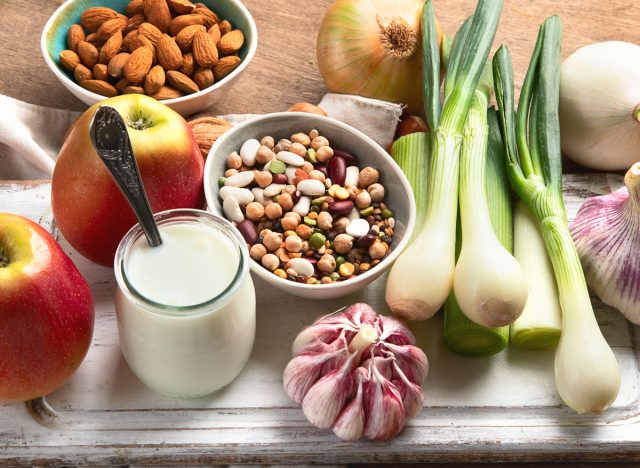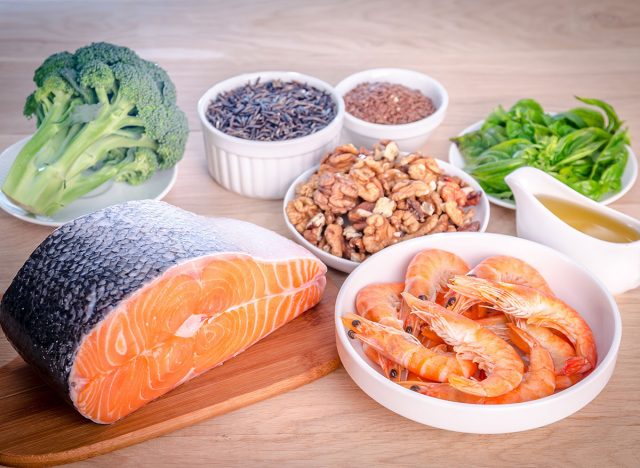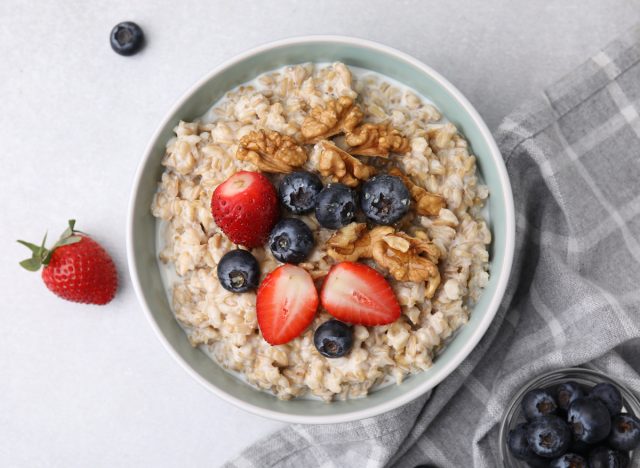Over 60? Avoid These 7 Eating Habits That Are Wrecking Your Body

Whether you've just entered your 60s or have been there for a second already, you can likely feel your body undergoing many changes. And because of this, it's important to continue adapting healthy habits with food and exercise. While there are plenty of habits you can try that will help you in your health goals, there are also certain ones that can wreck your body as you age. To find out which eating habits you should avoid in your 60s, we talked with some expert dietitians to get their advice.
Not Eating Enough Prebiotics

"Prebiotics are the nutrients that fuel your gut bacteria and are essential for ensuring your gut health remains strong and your hormones are supported as you enter this next decade of your life," says Kara Landau, RD and founder of The Prebiotic Dietitian. "As one ages, gut diversity diminishes naturally and this can have a negative impact on many aspects of health, including hormones responsible for satiety and weight management, overall metabolic health, and more. By consuming foods rich in prebiotics, such as onions, garlic, cooked and then cooled potatoes and rice, jicma, uncooked oats, legumes and lentils, as well as nuts such as cashews and pistachios, you can support the diverse bacteria in your gut to thrive, rather than diminish, and reap the ongoing benefits."
Eating Too Many Sugary Foods

"It may sound obvious to try and reduce sugar rich foods from the diet, however sugar often creeps in to the diet more than you may realise; from the added sugars found inside ready made sauces and dressings, to the many packaged breads that have been sweetened, the list is endless on where you may find sugar creeping into your daily meals. Make sure to always flip over a package before purchasing to review the ingredient list, and try to avoid items that have sugar (or an equivalent) within the first few ingredients," says Landau.
Not Getting Enough Heart-Protective Omega 3's or Plant Sterols in Your Diet

"Instead of only focusing on what to take out of the diet, it is important to think about nutrients that the body needs in order to keep various organs functioning optimally," says Landau. "As hormone levels change that may have once offered cardio-protective effects, it is important to consciously incorporate more omega 3 healthy fatty acids; and for those that may see their cholesterol levels slowly increasing, to find foods with added plant sterols. Wild caught oily fish, algae based foods, and to a lesser degree, plant based hemp seeds, walnuts and flax seeds can all offer omega-3s, together with fortified products that have either added omega-3s or plant sterols, to further support healthy cholesterol levels as time goes on."
Not Eating Enough Protein

Getting enough protein in your diet is important at any age because it "can help maintain muscle mass, strength, bone health, and is one of the best ways to help with your weight loss efforts," says Courtney D'Angelo, MS, RD, author at GoWellness.
However, protein becomes even more crucial for your well-being as you age. "Those over the age of 60 are more at risk for losing muscle mass, and not eating enough protein throughout the day could expedite the process," says D'Angelo.
She suggests incorporating more foods like eggs, salmon, grass-fed beef, chicken, or turkey into your diet when you can. "You can even adapt a healthy habit in the morning by choosing to add whey protein to your coffee or oatmeal, that way you can start your day off strong."
Not Drinking Enough Water

Another common habit to avoid in your 60s is becoming dehydrated and not drinking enough water. "As you age, your sense of thirst may diminish," says Lisa Young, PhD, RDN, the author of Finally Full, Finally Slim, and member of our medical expert board, "therefore, people in their 60s tend to be dehydrated more so than those who are younger."
Eating Late at Night

Many people may not realize this, but eating late at night can be detrimental to your health, even if you're partaking in healthier foods!
"Late-night eating often goes hand in hand with ultra-processed junk food and is particularly problematic, as overeating at night has been associated with weight gain, blood sugar fluctuations, and diabetes in an already vulnerable population," warns Young.
A Low-Fiber Diet

One of the worst eating habits to have is not getting enough fiber into your daily diet, because this nutrient is key in helping you live a healthy life.
"Make sure to include insoluble fiber to keep you regular, and soluble fiber to nourish the beneficial bacteria that live within your gut to improve the absorption of nutrients, reduce inflammation, and positively impact your mood," says Landau.
For a good dose of fiber, try incorporating foods like berries, oatmeal, apples, beans, or chickpeas into your daily diet.









